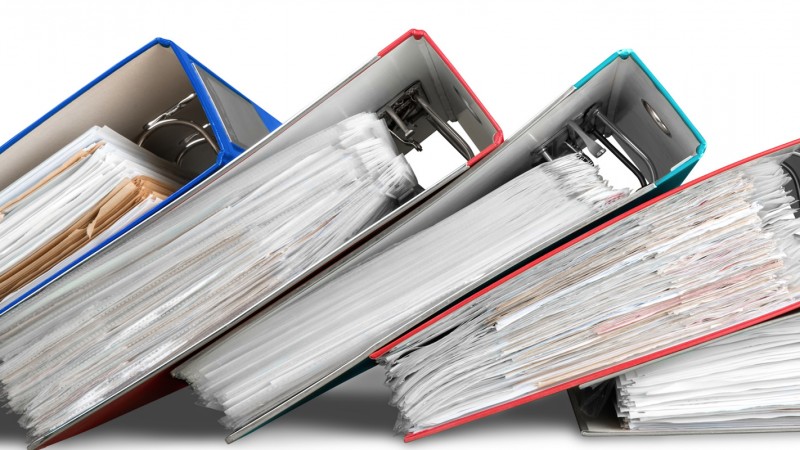Do You Know Where Your Financial and Important Papers Are?
- Details
- Written by Remar Sutton
- Category: Articles

Do you know where your financial and important documents are? If you had to leave your home quickly, could you easily find them? If something happened to you, could someone else find all of your important papers?
Knowing your financial and important papers are ready for you to grab quickly is both practical and offers peace of mind.
If you answered yes to all of these questions, congratulations, you are well organized. For the rest of us, this report profiles how to put your important records in order.
Which Documents Are Important?
Documents that prove identity, ownership, insurance coverage, and other various legal documents are important and should be kept in a protected but accessible location. These documents include, but aren't limited to, the following:
- Birth certificate
- Marriage license/certificate
- Social Security card
- Health Insurance ID card and/or policies
- Insurance policies: life, property, auto
- Vehicle registration and ownership papers
- Military discharge/Military ID
- Passport
- Estate planning papers: wills, trusts, financial powers of attorney, advanced health-care directives, durable power of attorney for healthcare
- Real estate titles and/or deeds
- Adoption papers
- Naturalization papers
Some of these documents are not easily replaced and should be kept in a secure location such as a safe deposit box. For easy reference, keep a copy at home of the documents stored in a safe deposit box. If you choose to keep these documents at home, then use a waterproof and fireproof box or safe.
Water and fireproof boxes range in size from small chests and file boxes to small, medium, and large size home safes. Price ranges from around $35 to over $400 depending on the size. You can find these products at many office supply, discount, and home improvement stores.
Since your important documents are stored in your security box or safe, you want to put the safe where unauthorized persons or intruders can not easily find it. Make sure, however, that someone else knows where the papers are stored, such as your spouse or designated adult children.
What Other Documents Should You Keep?
A very important list that many people don't have is a list of all of their bank, credit card, and investment accounts. You should document at least the following information for each account:
- Name of institution/firm/issuer of card
- Name of account holder
- Account number
- Customer/member services phone number
- Type of account — savings, checking, money market, or type of investment
- For credit cards: type of card, expiration date, and payment due date
You should also have a list of any loans you may have. This list should include auto, mortgage, line of credit, home equity, and student loans. Your list should contain the following for each loan:
- Payee
- Account number
- Name on the loan
- Payment address
- Payment amount
- Payment due date
- Date of final payment
- Customer service phone number
These lists should be kept with your other important documents in your waterproof, fireproof safe. (Because such a list contains much sensitive information gathered in one place, never leave it unsecured.)
Keep copies of your tax returns and supporting documentation —such as W-2 and 1099 forms, interest statements, and receipts—for at least 3 years and possibly longer.
Many people have many years worth of bank statements, credit card statements, cancelled checks, ATM receipts, sales receipts, pay stubs, deposit slips, check registers, and other slips of paper. Most of us keep these for years longer than necessary. Unless needed for tax purposes (in which case, they should be with your tax papers), one year is usually sufficient.
These papers can be saved in an envelope, box, file box, filing cabinet or whatever allows you to find them quickly and easily.
What About Electronic Papers?
In today's world, many of us no longer receive paper documents in the mail. We keep copies of bank statements, bills, and other financial information on our computers or other electronic devices. Not only do we need to make sure that we back up these copies, but we also need to provide instructions on how to access the various documents and online accounts. (Keep these instructions in your waterproof, fireproof safe.)
Even though many financial institutions—credit unions, banks, credit card issuers, brokerage firms—provide several months of back statements online and you can request copies of even older statements, you should keep your own backups. The simplest way is to burn a CD with your electronic documents and place it with your other important documents in your safe or safe deposit box. Remember to update it every couple of months. Another option is to get an external hard drive or a flash drive and save your data on it. You can also use an online backup service but there is a cost (usually monthly) associated with the best of these.
Other information you should document and keep in a safe place includes information on how to access your online accounts. These types of information include personal identification numbers (PINs), usernames and passwords, and other login information.
Ways to Organize Your Information
There are various ways to organize your documents. The best way is whatever method will work for you. You don't want to start with a method or system and then quit using it because it takes too much work.
Some people use a scanner to make copies of their important documents to save on their computer. There are software programs available that can help you organize all these bits and pieces. For example, the free online home inventory software from the web site KnowYourStuff.org allows you to add pictures and scanned receipts.
Tip: Always shred any papers containing financial or personal information before throwing them out. This can help thwart Identity thieves.
Once you have put your important papers in order, you can rest easy, knowing that you can put your hands on any important document when you need it. Should an emergency arise — such as the hurricanes and other natural disasters of the past few years—then knowing your financial and important papers are ready for you to grab quickly is both practical and offers peace of mind.
For More Information
The Emergency Financial First Aid Kit (pdf) prepared by Operation HOPE can help you identify and organize your key financial records. It is also a quick reference file for your important financial documents.






























